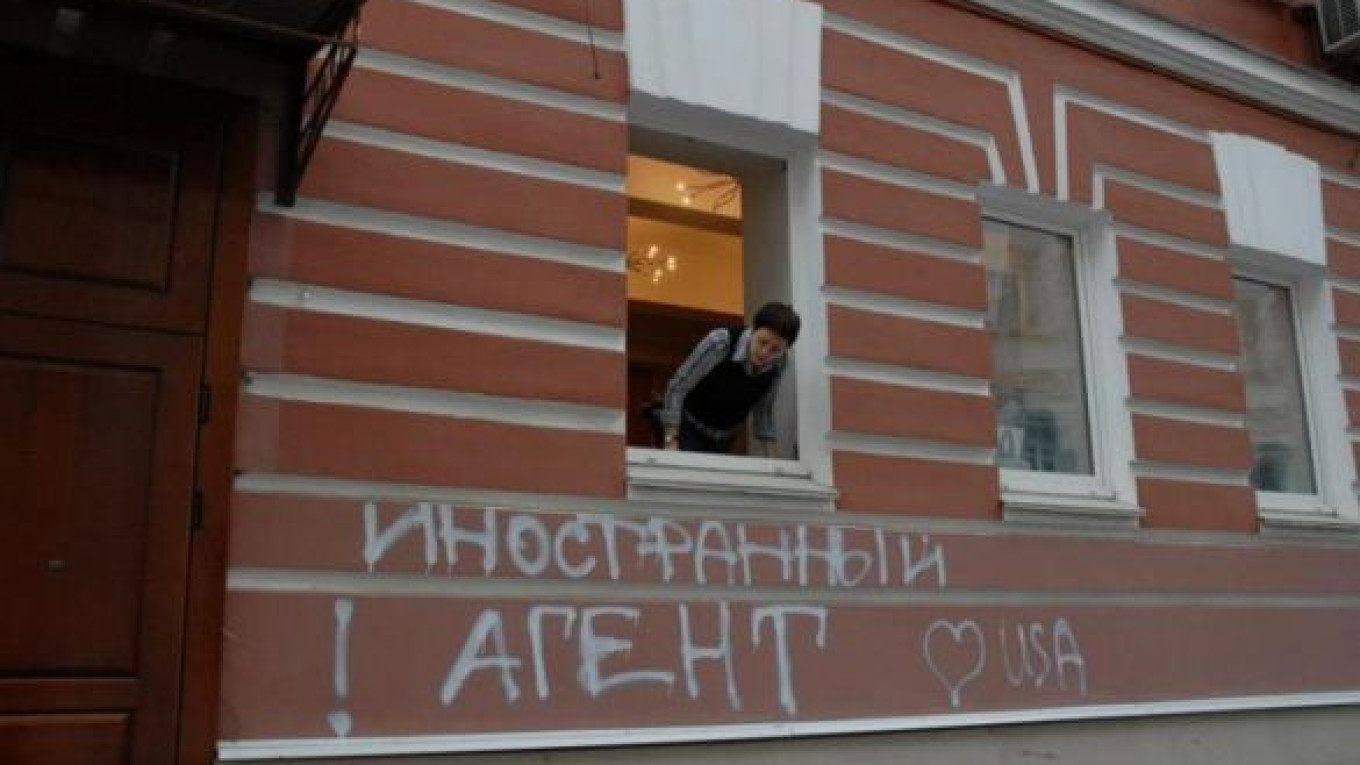A bill ostensibly aimed at cracking down on drug traffickers could end up being used to punish nongovernmental organizations that accept foreign financing, NGO representatives said.
Drafted by the Federal Drug Control Service, it appears rational on the surface, seeking to bar international drug traffickers from entering Russia or stashing their assets in the country.
But the document, published on the government's legislative projects website, also contains a lengthy passage ordering the suspension of NGOs that receive donations from foreigners whom Russia considers undesirable and bans from entering the country.
Given that the undesirables on Russia's current blacklist include a number of U.S. Drug Enforcement Administration agents and federal prosecutors, the new anti-drug measure seems to have less to do with drug enforcement and more with suppressing NGOs that are critical of the authorities, NGO representatives said.
"I have seen this bill," said Lev Ponomaryov, head of the For Human Rights group, Izvestia reported. "It's good that they want to ban drug dealers from entering Russia. But a big part of the text is devoted to the financing of NGOs. What's more, it doesn't specify which particular personas non grata's donations would be punished."
The bill vaguely instructs the government to prepare a list of people "connected to" international drug trafficking, including officials whose decisions "have led to the release from liability for people who committed crimes in the illegal drug trade sphere."
The wording seems to allow for a broad application, but the section devoted to the NGOs goes a step further. It doesn't explicitly say that only donations from drug suspects would be banned, instead suggesting that NGOs should be suspended for receiving money from anybody whom Russia has put on its blacklist.
Russia's list of Americans banned from entering the country — which was compiled in retaliation for U.S. sanctions under the Magnitsky law — includes a federal judge, one FBI agent, four U.S. Drug Enforcement agents, and eight federal prosecutors. Russia accuses them of violating the rights of Russians abroad.
Deputy Foreign Minister Sergei Ryabkov has said that there are more names on a "closed part" of the list.
The Federal Drug Control Service conceded that its bill was a continuation of Russia's response to the Magnitsky law, named after whistle-blowing Russian lawyer Sergei Magnitsky, who was arrested after accusing Russian officials of embezzlement and died in prison in 2009.
Besides compiling a blacklist of unwelcome Americans, the Russian government responded to the Magnitsky law by passing the "Dima Yakovlev law," in reference to a? Russian orphan who died after his adoptive U.S. parents left him in an overheated car. The law bans Americans from adopting Russian children.
"The current bill is ideologically similar to the recently adopted Dima Yakovlev law," said Federal Drug Control Service spokesman Vladimir Sinelshchikov, Izvestia reported.
The authorities have cracked down on NGOS in recent years, most recently with amendments that require those that receive foreign funding and are involved in political activities to register as "foreign agents" — a term that is often used as synonymous to "spies" in Russian.
Initially, the amendments were not supposed to restrict NGO activities. But this week the Justice Ministry proposed banning NGOs registered as "foreign agents" from sending observers to monitor conditions in Russia's prisons.
The new measure by the Federal Drug Control Service could further tighten government restrictions against NGOs.
"The Federal Drug Control Service, which is itself involved in shady deals and which we have criticized, has simply decided to create a new hindrance for NGOs," Ponomaryov said. "After all, they have hired people to stand with banners and shout that I am paid by drug dealers."
Russian officials have accused human rights groups, such as Ponomaryov's, of serving U.S. interests in exchange for receiving funding from abroad.
State Duma Deputy Vadim Solovyov, from the Communist faction, praised the bill as a way to curb the "drug dealers lobby."
"Public organizations, which are aimed to help people, must not receive any underground funding, particularly from the drug lobby," he said. "Drug dealers will be interested in influencing public opinion through financing NGOs."
A Message from The Moscow Times:
Dear readers,
We are facing unprecedented challenges. Russia's Prosecutor General's Office has designated The Moscow Times as an "undesirable" organization, criminalizing our work and putting our staff at risk of prosecution. This follows our earlier unjust labeling as a "foreign agent."
These actions are direct attempts to silence independent journalism in Russia. The authorities claim our work "discredits the decisions of the Russian leadership." We see things differently: we strive to provide accurate, unbiased reporting on Russia.
We, the journalists of The Moscow Times, refuse to be silenced. But to continue our work, we need your help.
Your support, no matter how small, makes a world of difference. If you can, please support us monthly starting from just $2. It's quick to set up, and every contribution makes a significant impact.
By supporting The Moscow Times, you're defending open, independent journalism in the face of repression. Thank you for standing with us.
Remind me later.


